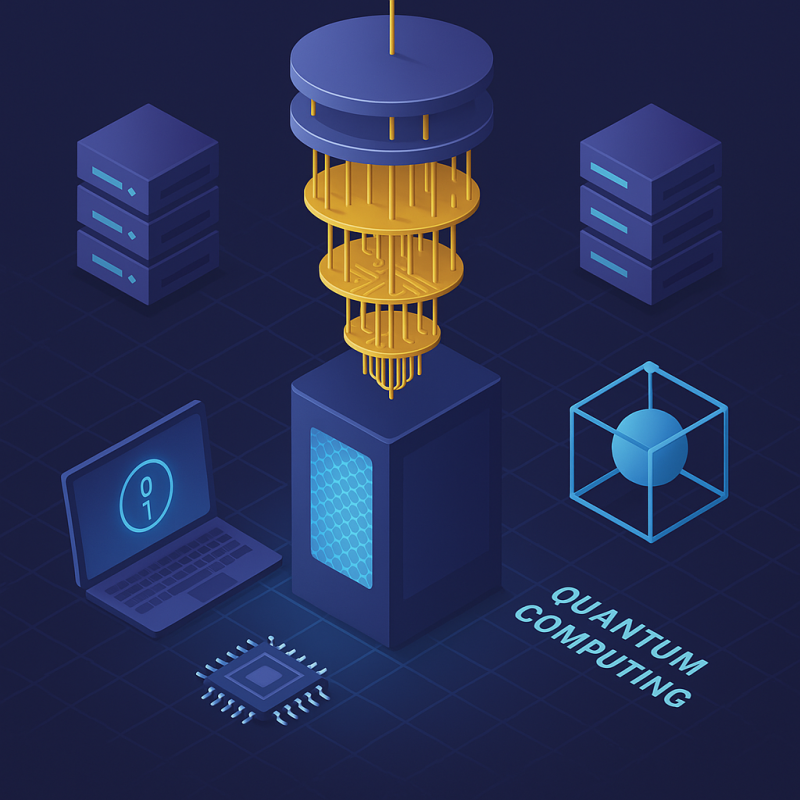Table of Contents Show
Quantum computing is poised to revolutionize the world as we know it. By harnessing the strange and powerful principles of quantum mechanics, these machines offer a fundamentally different way of processing information – one that could solve problems far beyond the reach of even our most advanced classical supercomputers.
From the secure transmission of information to personalized medicine, and from optimizing global logistics to modeling entire ecosystems, quantum computing could have an unprecedented impact on every major industry. However, the journey to realizing its full potential is complex, requiring groundbreaking advances in hardware, software, and theory. In this blog post, we’ll explore what quantum computing is, how it differs from classical computing, and why it could truly change everything.
Understanding Quantum Computing
To appreciate the power of quantum computing, we need to understand what sets it apart from classical computing.
Traditional computers use bits, which can be either 0 or 1. Every calculation, no matter how complex, is broken down into a series of operations using these binary values.
Quantum computers, on the other hand, use quantum bits, or qubits. Thanks to the quantum property of superposition, a qubit can be in a state of 0, 1, or both at the same time. This means a quantum computer can process many combinations of states simultaneously, giving it exponential computational power for certain tasks.
Another essential concept is entanglement. When qubits are entangled, the state of one is instantly correlated with the state of another, no matter the physical distance between them. This allows quantum systems to coordinate in ways classical systems cannot, enabling faster and more complex problem-solving.
Quantum algorithms, such as Shor’s algorithm (for factoring large integers) and Grover’s algorithm (for database searching), have already demonstrated that they can outperform classical equivalents for specific use cases.
Impact on Industries
The influence of quantum computing spans across nearly every field of human endeavor. Here are some of the industries likely to be most affected:
Cryptography
Cryptography is arguably the most immediately affected domain. Today’s secure communication systems rely on the fact that factoring large numbers (as used in RSA encryption) is extremely difficult for classical computers. However, Shor’s algorithm, running on a sufficiently powerful quantum computer, could factor those numbers in polynomial time, rendering current encryption methods obsolete.
This isn’t just a theoretical concern. Governments and corporations are already stockpiling encrypted data in anticipation of a future “quantum decryption” event – when quantum computers become powerful enough to crack existing encryption schemes.
Fortunately, quantum computing also offers a solution. Quantum Key Distribution (QKD) uses the laws of quantum mechanics to create encryption keys that are theoretically unbreakable. If a third party tries to intercept a quantum key, the act of measuring the key alters it, alerting the participants to the intrusion.
The transition to post-quantum cryptography is already underway, with institutions like NIST working to standardize quantum-resistant algorithms.
Medicine and Drug Discovery
One of the most promising applications of quantum computing lies in simulating the behavior of molecules at the quantum level – something classical computers struggle with. Understanding how molecules behave and interact is critical for drug discovery, and quantum simulations could dramatically speed up this process.
For instance, pharmaceutical companies like Roche and Pfizer are partnering with quantum computing startups to simulate complex protein folding and molecular bonding – tasks that could otherwise take years. IBM’s Quantum division is also actively researching this field, aiming to discover drugs more quickly and with fewer false leads.
Furthermore, quantum computing could help unlock personalized medicine by analyzing genetic data and predicting how individuals will respond to different treatments. This could lead to tailored therapies that are more effective and have fewer side effects.
Finance
In the world of finance, milliseconds matter. Quantum computing has the potential to revolutionize everything from option pricing models to portfolio optimization and fraud detection.
For example, Monte Carlo simulations, which are used for risk analysis, can be vastly accelerated using quantum algorithms. Quantum computing could also enhance algorithmic trading, improving decision-making by quickly analyzing huge amounts of market data and adjusting strategies in real-time.
JP Morgan Chase and Goldman Sachs are both investing in quantum research to explore these opportunities. While we’re not there yet, the financial industry is preparing for a world where quantum systems are part of the analytic and decision-making pipeline.
Logistics and Supply Chain
Optimizing routes, managing inventories, and minimizing waste are massive logistical challenges faced by industries such as transportation, shipping, and manufacturing. Quantum computing can help solve these problems more efficiently than traditional methods.
Companies like Volkswagen have already demonstrated the use of quantum algorithms to optimize traffic flow in cities. DHL and FedEx are investigating how quantum computing can help in supply chain management to deal with disruptions, reduce costs, and increase efficiency.
The Traveling Salesman Problem, a well-known logistics challenge that becomes exponentially harder as the number of destinations increases, is one such problem quantum computers are well-suited to tackle.
Energy and Climate Modeling
Quantum computing can assist in modeling complex physical systems, such as weather patterns or energy consumption, with far greater precision. This can enhance climate prediction models, enabling better policy-making and resource allocation.
It can also be used to develop new materials for clean energy, such as more efficient solar panels or batteries. In fact, quantum simulation could help scientists design materials with properties that we haven’t even discovered yet.
Challenges and Limitations
Error Rates and Decoherence
Despite all the promise, quantum computing still faces major technical hurdles.
Qubits are notoriously fragile. They lose coherence quickly when exposed to their environment – a process called decoherence – which can corrupt calculations. Even the best quantum systems today have error rates that are too high for practical, large-scale computations.
To solve this, researchers are developing quantum error correction methods, which involve encoding data across multiple qubits to detect and correct errors. However, this significantly increases the number of physical qubits needed to produce a single “logical” qubit.
Scalability
We are still in the Noisy Intermediate-Scale Quantum (NISQ) era – meaning our current quantum computers are not yet large or reliable enough to outperform classical systems for most practical tasks.
To make quantum computing truly transformative, we need scalable hardware platforms with thousands or even millions of qubits. Companies like Google, IBM, and startups like Rigetti and IonQ are racing to make this a reality, but it will take years, if not decades, to achieve full-scale, fault-tolerant quantum computing.
Software and Talent Gaps
There’s also a shortage of developers who understand quantum computing. Unlike traditional programming, quantum software requires a new way of thinking – entailing quantum mechanics, linear algebra, and probabilistic modeling.
Frameworks like Qiskit (IBM), Cirq (Google), and PennyLane (Xanadu) are emerging to help bridge this gap, but the field is still in its early stages.
Future Prospects
Potential Breakthroughs
Research is progressing quickly. Promising approaches include topological qubits, which may be more stable and resistant to decoherence, and photonic quantum computers, which use light instead of matter.
Another breakthrough to watch is quantum networking – the ability to link quantum computers together via entangled particles. This would allow distributed quantum processing and potentially a quantum internet.
A Quantum-Enabled World
In the long term, quantum computing could become embedded in everyday applications the way classical computing is now. It might operate behind the scenes, powering AI systems, optimizing power grids, or running predictive healthcare models.
Governments and corporations worldwide are already investing heavily in quantum research. The U.S., China, and the European Union have launched billion-dollar initiatives to ensure they’re not left behind in the quantum race.
According to a report from McKinsey & Company, the global quantum computing market could reach $700 billion by 2035 across sectors such as pharma, chemicals, automotive, and finance (McKinsey Report).
Conclusion
Quantum computing is no longer the stuff of science fiction – it’s a rapidly evolving field on the cusp of changing everything. Its ability to solve certain problems exponentially faster than classical computers could transform industries from cybersecurity to pharmaceuticals and logistics to clean energy.
Yet, we’re not there yet. Major engineering and theoretical challenges remain, from maintaining qubit stability to scaling systems large enough to tackle real-world problems.
Still, progress is being made at an incredible pace, and the coming decades are likely to witness a technological revolution akin to the invention of the internet or electricity.
Quantum computing will change everything – if we can unlock its full potential.









